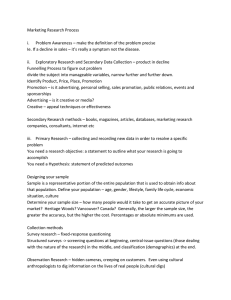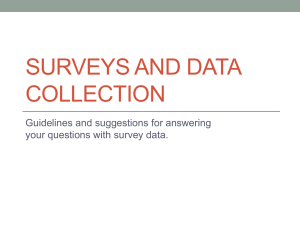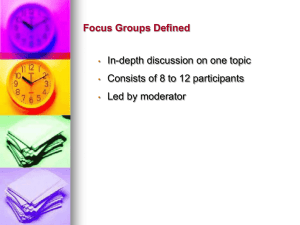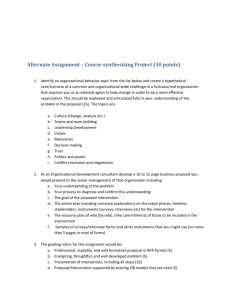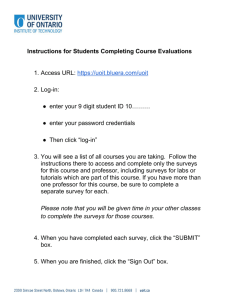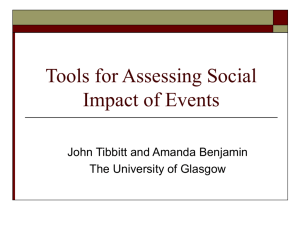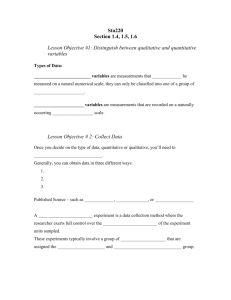Getting Customer Information If It Was Only This Easy!
advertisement
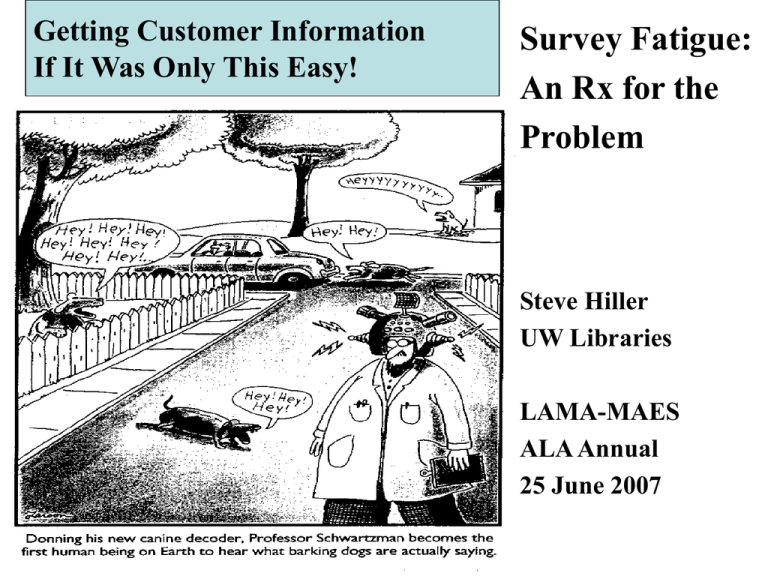
Getting Customer Information If It Was Only This Easy! Survey Fatigue: An Rx for the Problem Steve Hiller UW Libraries LAMA-MAES ALA Annual 25 June 2007 University of Washington Libraries Assessment Methods Used • Large scale user surveys every 3 years (“triennial survey”): 1992, 1995, 1998, 2001, 2004, 2007 – All faculty – Samples of undergraduate and graduate students – Research scientists, Health Sciences fellow/residents 2004- • • • • • • In-library use surveys every 3 years beginning 1993 Focus groups/Interviews (annually since 1998) Observation (guided and non-obtrusive) Usability Use statistics/data mining Information about assessment program available at: http://www.lib.washington.edu/assessment/ Customer Information Questions Before You Begin • What information do you need and why – Actual or perceived • • • • • Who do you need it from When do you need the information What resources/staffing are needed How will you analyze results How will you use the results Which methods will you use to get the information Customer Surveys: Some Caveats • Potentially long lead time needed – Survey design, human subjects approval, campus coordination • Expense (direct and indirect costs) • Tends to measure perceptions not specific experiences • Survey population factors – Sample size, representativeness, response rate, survey fatigue • • • • Expertise needed for design, analysis and interpretation Understanding & using results may be difficult to achieve Questions often asked from “our” perspective & language Recognize the value of your respondent’s time Gresham’s Law Adapted to Web Surveys Many Bad Web Surveys Drive Down Response to All Surveys • Logistically easier to create and use Web-based surveys • Can construct surveys without understanding of good survey methodology • Many web survey characterized by low response rates • Self selection among respondents adds bias • Increasingly difficult to generalize from respondent results to entire population (even if they are representative Last week . . . Directly to Me • • • • • 2 hotel “how was the stay” surveys UW Faculty club survey Last medical appointment survey (paper) Airline reservation “experience” survey Online shopping “experience” survey And a bewildering number of pop-up surveys on Web sites Survey Response Reasons • • • • • • • Civic duty Personal connection Authority Public/social good Self-interest Reciprocation Incentives Why would I (or you) respond to a survey? Survey Alternatives • • • • • • • • • • Focus groups Observations Usability Interviews Customer “panels” Data mining Social networking info Comments (solicited/unsolicited) Counts (manual and automated) Logged activities Use or Repurpose Existing Information • • • • • • Community/institutional data sources Previously collected information Library use data (including e-metrics) Acquisition requests and interlibrary loan data Computer/Web log data Comparative or trend data from other sources Qualitative Provides the Context • Qualitative information from comments interviews, focus groups, usability can often tell us: – How, why – Value, impact, outcomes • Qualitative information comes more directly from users: – Their language – Their issues – Their work • Qualitative provides understanding Observational Studies • Describe user activities in terms of: what they do how they do it how much time they take problems they encounter • • • • • Can be obtrusive or unobtrusive Can be tied in with interviews or usability Well-developed data collection method/protocol essential Room counts/customer facilities use most common Quick and inexpensive; can use sampling Observational Studies Use For: • Time sensitive • Low-cost support • Reality check • Help identify/define issues (including usability) Be Aware Of: • Intruding on users • Not representative • Limited focus • Defining data points needed • Data collection and analysis issues Interviews and Focus Groups • • • • • • High degree of customer involvement Clarify and add context to previously identified issues Customer defined language and issues Objective and effective interviewer/facilitator needed Analysis can be complicated complicated Can identify broader patterns, themes, consistency but not generalizeable to broader population • Interview/focus group themes can be followed up with other methods Interviews • Becoming the method of choice for understanding user needs, work, behavior and outcomes • Can be done efficiently and effectively • Purpose defined; questions should be well-thought out • Need skilled/trained interviewer • People like to talk/tell you what they think • Structured but flexibility to follow-up within the interview Focus Groups • Structured discussion to obtain user perceptions and observations on a topic • Usually composed of 6-10 participants and may be repeated several times with different groups • Facilitator or moderator guides discussion • Participants encouraged to share perspectives • Participants learn from each other Focus Groups • Use For: • Be Aware Of: • • • • • • • Topic needs to be clear • External facilitator • Minimum # of participants • Not representative • Complex logistics • Wandering discussion • Transcription costs/time • Complicated analysis It May Take More Time Than You Think High user involvement Identify or clarify issues User defined perspective Focus group “bounce” Intermediate time/cost Results can lead to use of other methods Analyzing Qualitative Data • Identify key themes • Categorize them • Review for: – – – – – – – Frequency Extensiveness Intensity Body language Specificity Consistency Language Specialized (e.g. Atlas T.I.) or standard applications (e.g. MS Access) can be used to help analyze Use Data Wisely • • • • Understand your data Know the limitations of your data Use appropriate analysis methods and tools Comparative data provide context and understanding • Seek internal or external validation • Identify what is important and why Using Data Unwisely! “ Oh, people can come up with statistics to prove anything Kent [Brockman]. 14% of people know that.” “Facts are meaningless. You could use facts to prove anything that's even remotely true!” Homer Simpson
